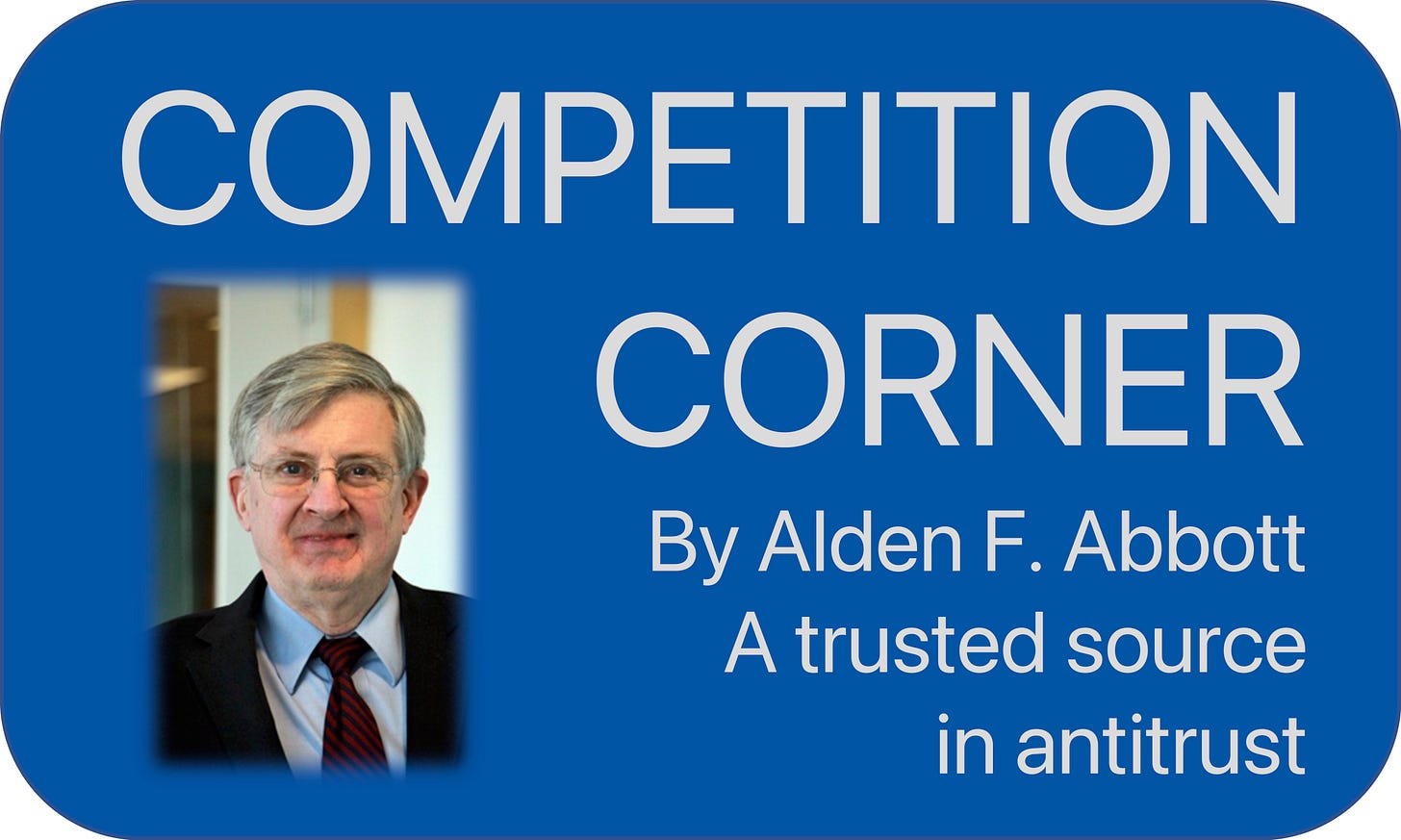Competition Corner by Alden Abbott - Just Say No to Interventionist Overreach
Issue #6
Originally Posted June 16, 2022
Attacks against the large tech companies are coming into full force before Congress’ August recess in an attempt to pull together a coalition of lawmakers to pass groundbreaking legislation that would reshape the economy as we know it. Some claim that market concentration is the cause of supply chain shortages, high prices, and inflation, and breaking up large companies is the only way to save the middle class. I would urge these policy makers, however, to think critically about the untold damage that these proposals would have on innovation and the economy. Saying no to interventionist overreach may not be in vogue, but it will help the American economy stave off the stagnant growth that has plagued Europe.
Highlighted in my newsletter this month are a pair of discussions that I had with the folks over at the R Street Institute and the Our Curious Amalgam podcast. The first walked through different sides of the debate over Big Tech and antitrust, and the second dove deep into my time as the FTC’s General Counsel and the role of a GC in government.
Showcased next is a series of commentaries pushing back against the idea that concentration is the root of all of our problems. From media analyses of baby formula shortages and gasoline prices, to mergers and standard essential patents, flawed reasoning reigns supreme. Unfortunately, many commentators are not accounting for the cost of government regulatory intervention when discussing disruptions, and it is leading to a skewed, and often patently false, assessment of the competitiveness of the American economy. Government interference is likely the largest threat to competitiveness and rolling back some of the most blatantly harmful programs would go a long way to achieving the President’s stated competition goals.
Antitrust Law and Big Tech: Present and Future | R Street
The Biden administration, via the President’s Executive Order on competition and by its appointees to key economic policy and antitrust enforcement posts, has made clear its intent to usher in a new era of progressive-led antitrust reform, but key questions remain unanswered. Are the current antitrust laws too lax in policing anticompetitive behavior in the digital economy? What changes in enforcement or law, if any, are necessary to deal with novel competition concerns posed by the size and reach of these companies? On May 16 2022, George Slover, Daniel Hanley, Christopher Yoo and I participated in an R-Street Institute panel moderated by Sarah Oh, where we discussed and debated the merits of the administration’s proposals and the possibility of rulemaking by the FTC.
Don't Blame the Market: Who Really Caused the Baby Formula Shortage | The National Interest
Blame restrictive regulations and protectionism for the formula shortage. In a recent commentary for the National Interest, Giorgio Castiglia and I laid out the reasons why formula shortages have been so damaging. The Agriculture Department’s WIC program (which establishes government-favored providers), protectionist tariffs, and FDA mismanagement have all contributed to concentration in the formula market, exacerbating the shortage. Notably absent, however, is any evidence of monopolistic or anticompetitive conduct.
Chair Khan’s Latest Flawed Perspective on Mergers Ignores Empirics and Sound Economics | Truth on the Market
FTC Chair Lina Khan missed the mark once again in her May 6 remarks on merger policy, delivered at the annual meeting of the International Competition Network. In a commentary for Truth on the Market, I argue that Chair Khan’s speech sends all the wrong signals on merger guidelines revisions—It strongly hints that new guidelines will embody pre-conceived interventionist notions at odds with sound economics.
Dear FTC: Blame the real culprits of high gas prices | The Hill
The Biden Administration’s blind spot for competition-distorting federal regulations is causing serious harm to the nation’s pocketbook. In a commentary for The Hill, Andrew Mercado and I push back against the price-gouging narrative so often advanced when talking about sky-high gas prices, and urge the FTC, with its newly minted Democratic majority, to examine the Jones Act, which for the last century has done immense damage to the economy.
Khan & Slaughter Make ITC Filing Supporting Policies that Would Undermine SEPs and US Innovation | Truth on the Market
Federal Trade Commission (FTC) Chair Lina Khan recently joined with FTC Commissioner Rebecca Slaughter to file a “written submission on the public interest” in the U.S. International Trade Commission’s (ITC) Section 337 proceeding concerning imports of certain cellular-telecommunications equipment covered by standard essential patents (SEPs). In a recent commentary for Truth on the Market, I argue that the ITC should accord zero weight to Khan and Slaughter’s fundamentally flawed filing in determining whether ITC exclusion orders should be available to SEP holders.
Upcoming Events
Concurrences FTC Rulemaking Authority Conference: June 27, 2022
The time has finally come for the much anticipated Concurrences conference on FTC rulemaking authority. I will be speaking on the second panel of the day with Marina Lao, Maureen Ohlhausen, and Richard Pierce, moderated by Aurélien Portuese. A Concurrences book of essays on FTC rulemaking, including a chapter by me, will also be released at the Conference. See the description of the panel below, and sign-up to attend the conference at the National Press Club at the link above.
My panel will debate the authority of Congress and the FTC’s rulemaking power may be debated, particularly from a UDAP versus UMC perspective. In addition, my panel will address questions and issues regarding conflicts of law between administrative and existing case law and jurisdictional conflicts regarding the application of FTC rules only by the FTC. Other conference panels will address antitrust and legislation, and evaluate the costs and benefits of FTC rulemaking versus enforcement.
Our Curious Amalgam
On a soon to be released episode of Our Curious Amalgam, I sit down with Anora Wang of Arnold & Porter to discuss the role of a General Counsel at the FTC, my time as the FTC’s General Counsel, and more. See the link above for an archive of all the podcast’s content and check back in the coming weeks for the release of the podcast.
What’s Alden Reading?
This month, I am taking the opportunity to survey recent pieces by both young and established researchers and commentators focusing on tech and concentration. Big questions are floating around inside the Beltway these days, such as “are markets too concentrated” or “is Google’s market power in search and advertising anticompetitive?” Keith Klovers and Robert Kulick answer the first question with a resounding no. Overall, they find that concentrated markets get less concentrated over time, and market concentration has declined, not increased, since 2007.
Next, in a pair of complementary articles focusing on Google, Emily Washburn looks to Google’s history and Andrew Mercado looks to Google’s future under proposed legislation. Ms. Washburn surveys the history and competitive landscape that Google has faced since its inception and comes to the conclusion that, based on the history of businesses like Walmart, General Motors, and Microsoft, Google’s market power is not a given, and no company stays unbeatable forever. Mr. Mercado looks to Google’s future under the proposed Competition and Transparency in Digital Advertising Act, and posits that ownership restrictions under the Act, if it is enacted, will make advertising markets less efficient and worse for consumers.










